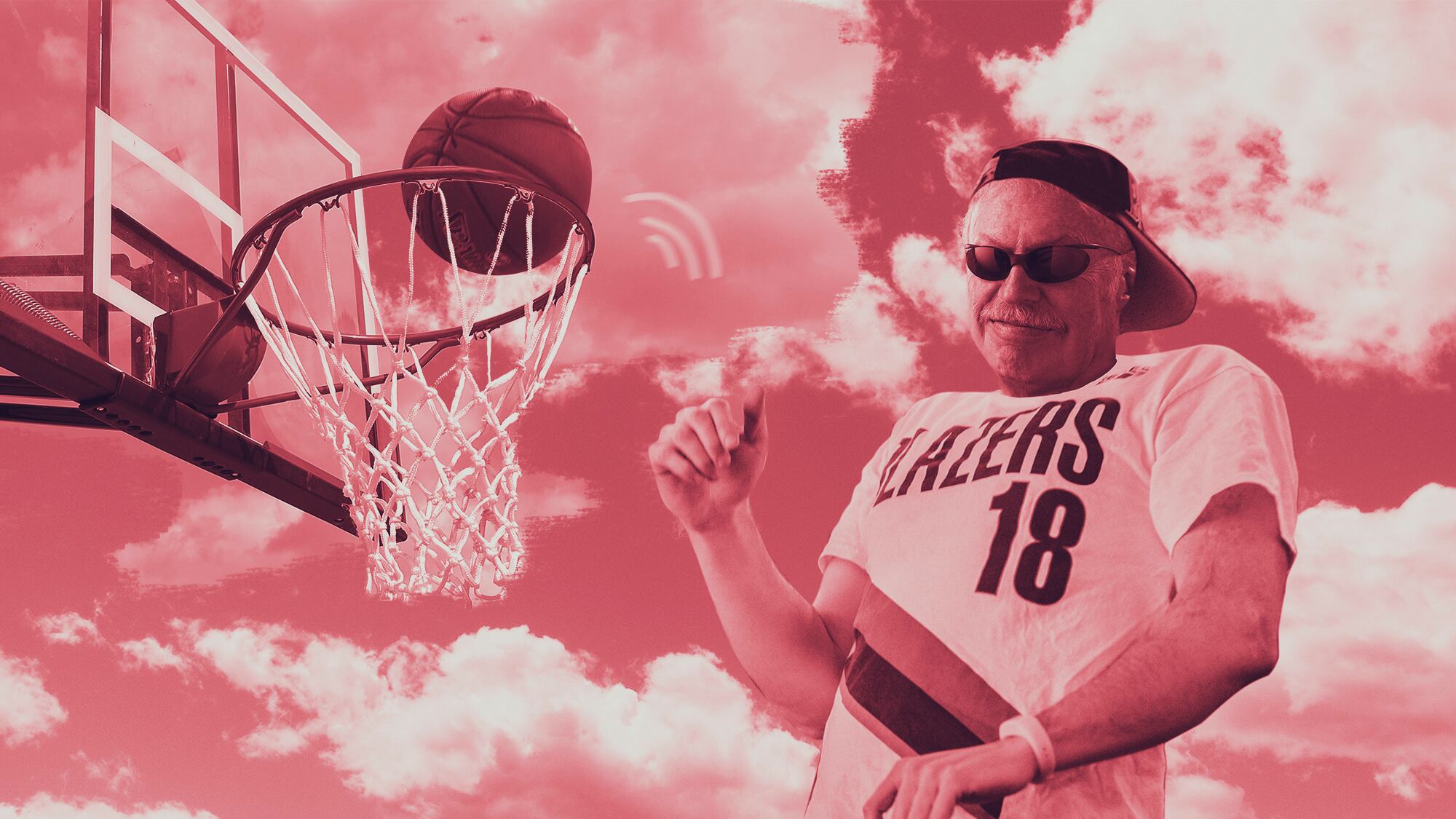Uncle Phil is going to save the Blazers!
It’s been a tough couple years for Trail Blazers fans. Portland has been forced to sit through injuries, a coaching search that summoned the memory of rape allegations, an insurance fraud arrest, iffy labor practices, the dismissal of an embattled vice president, and some truly atrocious basketball.
Let’s just say you’d be forgiven for avoiding any Rose Garden pilgrimages lately.
Enter Phil Knight. As the Blazers approach a 20-year nadir, news broke that the super-billionaire Nike founder has put in a $2 billion written bid to buy the franchise from the Paul J. Allen Trust.
Blazermaniacs rejoiced at even the possibility. (Shortly after the initial reports, the Trail Blazers issued a terse statement: “An offer was made by Phil Knight. The team remains not for sale.”) For the first time in 34 years, someone other than Allen or his estate could own the team.
Why are Blazers fans excited about the possibility of Knight taking the reins? Here are five reasons.
1. NBA teams must pay for success.
The Blazers are not a franchise that’s gone out of its way to be the pro version of Nike U. The team’s best player wears Adidas, and the front office couldn’t even be bothered to draft Dillon Brooks. Knight’s fascination with University of Oregon athletics hardly seems relevant to NBA fans.
What is relevant: $46.5 billion. That is Knight’s current net worth, according to Forbes. That makes him the 26th wealthiest man in the world.
In the NBA, you have to buy success. Teams that spend more money on player payroll have better odds of a deep playoff run.
For his part, Knight has demonstrated he’s willing to invest hundreds of millions, if not billions, in pet sports projects. The investing group that made the bid to buy the Blazers also included Alan Smolinisky, part owner of the Los Angeles Dodgers. The Dodgers currently have the second-highest payroll in baseball, at over $260 million.
“Knight has insisted for years that he has no interest in buying a pro sports team,” says Sean Highkin, an NBA writer for Bleacher Report. “So the fact that he’s suddenly changing his mind at age 84 would suggest he isn’t going to buy the Blazers to not spend money on them—especially when you look at the money he’s poured into University of Oregon athletics.”
Knight, Smolinisky, et al., raining cash on the Rose Garden’s hardwood would represent a new phase for the Blazers. With a few exceptions, management has focused on keeping costs under control in recent years, going out of its way to avoid the league’s punitive repeater tax penalty since burning nearly a quarter-billion dollars on mediocre players in 2016.
The cost-saving mindset came to the forefront this season when new general manager Joe Cronin traded away multiple talented veterans, including CJ McCollum, to cut over $140 million from the payroll. These moves tanked the Blazers into the No. 7 overall draft pick, but also left them with very little proven talent.
It’s going to cost a lot of money to just keep the Blazers’ core intact, to say nothing of rebuilding the shallow bench rotation. Whoever does buy the Blazers from the Allen Trust is going to need a Nike-size fortune to make it work.
“Phil Knight has 10 times more money than Mark Cuban. Mark Cuban is a billionaire,” says Mike Richman, who hosts the Locked On Blazers podcast. “If Knight wouldn’t spend wildly to try to make the Blazers a consistent winner or consistent almost winner, then who possibly would?”
2. The WNBA could be attached.
Shortly after ESPN broke the news of Knight’s bid for the Blazers, former Oregonian sports columnist John Canzano added a detail: The Knight-Smolinisky group also includes Kirk Brown, tech billionaire and founder of ZoomInfo. (It’s a company that ensures internet advertisers know what vacation destinations you’ve searched.)
Brown’s possible involvement is interesting because in February, WW reported that he’s leading a group seeking to return a WNBA team to Portland. It’s unclear if Brown plans to continue pushing for a WNBA team as part of a Blazers deal, but The Athletic identified Portland as a possible expansion city for the WNBA last week.
Portland hosted a WNBA team two decades ago, but the Fire folded unceremoniously in 2002 when Allen opted not to invest in the Blazers’ sister team. So what stands in the way of a new women’s professional basketball franchise in Portland? The sale price demanded by Allen’s estate.
Tara Bowen-Biggs, who hosts the We Have a Take podcast, says the prospect is thrilling.
“There’s just something extra special for me about cheering for women,” Bowen-Biggs says. “I think Portland fans would be so excited to have another top-tier women’s team to cheer for. We’re all hungry for more basketball and adding an additional team would mean basketball practically all year round.”
3. He’ll be punctual at Dame Time.
Trading away McCollum and his teammates has not entirely relieved the Blazers of salary concerns. Anfernee Simons is due $20 million-plus per year as a free agent. Jusuf Nurkic is also a free agent after making $18 million last season. Josh Hart is set to earn $13 million this season and will need a new contract next year.
The Blazers have also been linked to several high-profile, high-salary players, including Jerami Grant and Deandre Ayton.
Most importantly: Portland hero Damian Lillard hopes to sign a $100 million-plus extension for the 2025-26 and 2026-27 seasons this summer.
Obviously, the entirety of Portland has no issue with paying Lillard. I’ll toss the obligatory $10 into Venmo right now!
But a new owner with no ties to the area might be a bit more squeamish about paying nine figures for a player on the “wrong” side of 30. Even if the contract gets signed before the sale, it could be a point of contention down the road if championship banners don’t start getting hung. Not ideal.
Knight, given his lifelong ties to the state, presumably understands the paramount adoration that Lillard has earned in this city. Knight’s more likely to “get” Lillard Time, in other words. Ironically, it’s Nike money that could keep Adidas’ biggest pitchman in Portland.
4. Knight could make a clear-eyed appraisal of leadership.
Knight’s companies have worked with many of the most famous athletes on the planet, and he helped turn the University of Oregon athletics department into a national powerhouse.
In other words, he associates with winners. Knight’s purchase of the Blazers would turn the team into something of a Nike satellite—which would increase the likelihood of attracting a second superstar.
“NBA owners don’t attract free agents. Markets and rosters do,” Richman says. “The value of NBA ownership is that they would hire the right people to build a talented roster and then pay to keep that roster together or upgrade as needed and without hesitation.”
About those right people: There’s still good reason to ask questions about head coach Chauncey Billups. He was hired under alarming circumstances and did not inspire confidence in the first half of last season prior to Lillard’s shutdown. Fortunately, former general manager Neil Olshey only hired Billups for five seasons.
The new ownership group will need to be capable of facilitating an honest evaluation of Billups’ fitness as head coach. That’s going to be a very delicate deliberation.
Similarly, the Blazers recently hired Cronin to a five-year contract. Reviews of Cronin’s fire sale of the roster have been mixed—though both he and Billups seem to have won Lillard’s faith. But the reality is that both men have job security in part because nobody is closely evaluating them from Seattle.
Knight’s arrival would be bad news for the Blazers brain trust. But it means a frank appraisal of their competency—and fans should welcome that after years of unaccountability.
5. Finally: Jumptown!
The Blazers lease to play in the Rose Garden expires in 2025. Renewing it will require a negotiation with the city of Portland, which technically owns the land under the arena. It’s complicated.
Negotiations between governmental entities and pro sports teams have broadly not ended well for the cities involved. The promised economic benefits simply don’t appear, in most cases. When the Rose Garden was built it was championed as a driving force that would turn the Rose Quarter into a commerce hot spot. That hasn’t happened.
Speculation among people with knowledge of the lease is that the Allen Trust would prefer to clear up the terms before selling the team—the stability might fetch a higher price. But Knight is among the prospective buyers who might prefer the possibilities of an underused district like the Rose Quarter. (Don’t forget that Sam Adams, the former mayor who once tried to turn the Rose Quarter into a nightlife district called Jumptown, is back in City Hall.)
Fortunately, Phil Knight has never once asked Oregon for a tax break.

